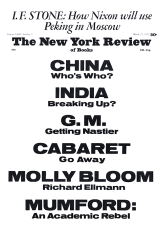In response to:
Through the Keyhole from the February 10, 1972 issue
To the Editors:
I was stunned and dismayed by your treatment of The Game of the Foxes [NYR, February 10], not because of your categorical rejection of my book, but because of the cheapness and vulgarity of your review. Obviously I am another victim of the eminent Alan John Percivale Taylor’s feuds and frustrations. A review as passionately biased and venomous as his cannot hurt the book. It merely casts reflection on the integrity and, perhaps, sanity of the reviewer.
What Taylor appraised was not my book, but phrases he picked at random, and subsidiary sentences taken out of context, thus concocting the crime to fit the savagery of the punishment. My first inclination was to ignore his blast, predictable and characteristic as it was, coming from your house-expert of espionage (“not qualified,” by his own admission). If I respond to his nitpicking, it is not to defend my facts, but to demonstrate how inane and contrived his objections were. Those who read my book will find that his samples of what he called “undiluted nonsense” represented sheer fakery.
I did not equate The Link with Lady Astor’s coterie at Cliveden, except to say in passing that both groups of prominent, Britons had their quota of Nazi sympathizers. Our capture in 1945 of a contraption resembling our Norden bombsight was mentioned as a mere anecdote. If Taylor had read on, he would have found that we had learned already in 1941, through the arrest of the spy who stole the blueprints, that the Germans had the device. The fact that Hitler’s decision to occupy Italy ahead of us in 1943 had been triggered by the interception of the unscrambled Roosevelt-Churchill conversation was fully documented in the War Diary of the German High Command. As far as the allegedly nonexistent secret clauses of the Franco-Russian pact are concerned, I would be delighted to send Taylor a copy of this document, to lighten the burden of his ignorance.
For all its contortions and distortions, Taylor’s article raises an important issue. It is the critical conflict between academic historians like Taylor and historical reporters like myself. No matter how hard we may try, we can never do right by their standards and prejudices. We all suffered at various times from the barbs of their misplaced jealousies.
Taylor was quite blunt on this score when he wrote in the concluding passage of his article: “I hope we shall have no more war diaries and certainly no more spy stories from the Second World War. Indeed the time has come when the Second World War can be left to the detached studies of historians.”
Isn’t it obvious that, in the light of Taylor’s own confused and warped account of the origins of the Second World War, the history of that war is far too serious a matter to be abandoned to the exclusive care of professional historians?
Ladislas Farago
Beverly Hills, California
A.J.P Taylor replies:
I had never heard of Mr. Farago before I reviewed his book and was not, therefore, in a position to conduct a feud against him.
This Issue
March 23, 1972



